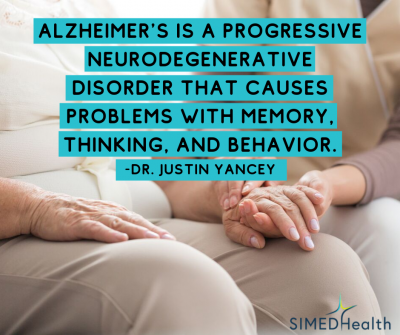
Half of the people aged 85 and older live with Alzheimer's disease. September is World Alzheimer's Month, and Saturday, September 21st is World Alzheimer's Day. We talked to Gainesville located neurologist, Dr. Justin Yancey about this neurological condition and what some early warning signs look like.
What is Alzheimer's?
Dr. Yancey says, "Alzheimer's is a progressive neurodegenerative disorder that causes problems with memory, thinking, and behavior." Symptoms typically develop slowly, get worse over time, and eventually become severe enough that it interferes with daily functioning. He also adds, "The prevalence of Alzheimer's disease is expected to rise over the coming years. Extensive research is currently ongoing, looking at earlier diagnosis, new therapies, and prevention. Patients with suspected Alzheimer's or other dementias should go to a neurologist for additional care."
What are the early warning signs of this disease?
Some possible early signs of Alzheimer's include difficulty completing familiar tasks, confusion, memory loss that disrupts daily life, and trouble finding the right words. Dr. Yancey states, "It is essential to know that not all of these may show in a person with Alzheimer's. As well as having some of these does not mean that person will develop Alzheimer's disease."
Is there something that triggers it?
Many factors contribute to the development of Alzheimer's disease. "It is likely a complex mix of genetic, lifestyle, and environmental factors," explains Dr. Yancey. Increasing age is the most important known risk factor, and the disease doubles every five years beyond the age of 65. Some possible modifiable risk factors include high blood pressure, obesity, and diabetes.
It is common knowledge that there is no cure, but there are treatments for symptoms. What are those treatments?
There are two types of medications prescribed for patients with Alzheimer's disease. Dr. Yancey describes, "They aim to help reduce memory loss modestly over time. Other medications can be used symptomatically to help with mood and behavioral issues."
What is the difference between Alzheimer's and dementia?
Dr. Yancey answers, "Dementia is an overall term used to describe symptoms that affect memory, thinking, and communication abilities. Alzheimer's is the most common form of dementia affecting about 5.8 million Americans and about 60-80% of dementia cases."
Click here to schedule an appointment with Dr. Yancey!